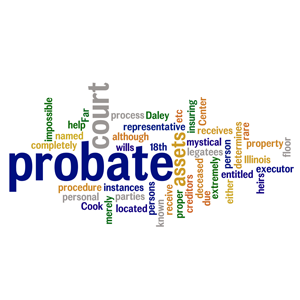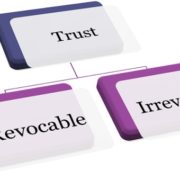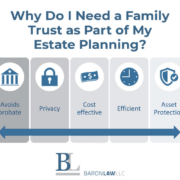Procedures To Shorten Or Avoid Probate Of An Estate
Cleveland, Ohio, estate planning lawyer, Daniel A. Baron, Ohio, offers the following information on what types of probate procedures shorten or avoid the need to probate and estate when speaking with your attorney when you are establishing your comprehensive estate plan.
When an individual dies, their “probate assets,” such as property not dispensed via beneficiary designations, transfer on death designations, or held within trust, go through probate.
Probate is the legal process provided by Ohio law where a probate court “sets the table” to administer a decedent’s estate. Namely, the probate court appoints an authorized fiduciary for decedent’s estate, determines the validity of a will, if there was one, oversees the determination of probate assets of decedent, and ensures probate assets are collected, maintained, and distributed to the proper parties according to decedent’s last wishes or, if there was no will, according to the laws of Ohio.
Probate is not a straight-forward process and it takes, usually, at least six months to complete and close an estate. Therefore, the two most common questions clients of estate planning attorneys ask is, why does probate take so long and how can we shorten or avoid the probate process. There’s a handful a probate processes one can use, if the circumstances of the estate qualify, within the Ohio legal codes to shorten or avoid the need to administrate probate. The following are of the few most widely used accompanied by minor explanations. Naturally, a Cleveland estate planning attorney can provide more expansive elaboration on these processes and guide you towards the ones that are best suited for a particular situation.
Filing Will for Record Only
A Will can be filed with the probate court when no probate administration is expected or required for the estate. For this type of probate proceeding, no appointment of an executor is needed. The benefits of going this route is administration costs are totally avoided but since the Will was properly delivered to the court, federal estate tax returns can be filed and exemplified copies of the filed Will are obtainable for out-of-state probate proceedings. This process is often used when certified copies of a Will are needed for administrations of out-of-state property owned by Ohio residents.
Summary Release from Administration
A summary release from administration is the most abbreviated probate proceeding for obtaining a release of assets. Usually, this type is used for small estates, such as those with minor amounts of personal property or a small bank account to distribute. The most common situation where a person would go this route is to get reimbursement from the estate for funeral expenses. Again, no executor is appointed in this proceeding.
Ohio law, however, does limit which estates may use this type of probate proceeding. This process may only if used if either:
- If value of the assets of the decedent’s estate does not exceed the lesser of $5,000 or the amount of the decedent’s funeral and burial expenses, any person who is not a surviving spouse and who has paid or is obligated in writing to pay the decedent’s funeral and burial expenses, may apply to the probate court for an order granting a summary release from administration: or
- There is a surviving spouse, the decedent’s probate assets do not exceed $45,000, the spouse is entitled to 100 percent of the family allowance, and the funeral bill has been prepaid or the surviving spouse is obligated to pay the funeral bill.
Release from Administration
A release from administration is the next tier up in regards to available abbreviated probate proceedings for obtaining a release of estate assets. No executor is appointed for this proceeding but a commissioner might be used if the facts surrounding the estate are more complicated than anticipated or if a determination of decedent’s ownership rights is necessary.
For this proceeding, the applicant certifies the nature and value of the probate assets to the court and the identity of decedent’s creditors and the amounts they are owed. If the decedent died testate, i.e. with a valid Will, the application to relieve the estate from administration is filed with the Will, along with all of the forms necessary to admit a Will for probate. Further, the decedent’s next of kin and devisees under the Will are notified and are parties to this process. If everything goes as it should and all the requirements are met, the probate court will issue an order releasing the probate assets, the payment to creditors with valid claims, and the distribution of probate assets.
Again, Ohio law does limit which estates qualify to use this type of probate proceeding. The process may be used only if either:
- There is no surviving spouse or the surviving spouse is not entitled to all probate assets and the probate assets are $35,000 or less and the decedent died on or after November 9, 1994. (Different asset levels apply for qualification if decedent died prior to this date.)
- The surviving spouse is entitled to all of the probate assets and the probate assets are $100,000 or less and the decedent died on or after March 18, 1999. (Again, different asset levels apply for qualification if decedent died prior to this date.)
Avoiding or limiting the probate process through selective use of codified probate processes is one way of preserving estate assets and saving everyone’s time. There are, however, other methods that avoid probate but also carry positive benefits for the estate, heirs, and intended beneficiaries. Creative and conscientious use of estate planning tools such as trusts, pour-over wills, and P.O.D. and T.O.D. designations can see even more savings for friends and family of a recently deceased. Contact a local Ohio estate attorney and find out the best way to plan your estate to maximize what is left behind for those you love and save time and expenses when going through probate.
You don’t have to be rich to protect what you’ve spent a lifetime trying to build. To find out whether a trust is right for your family, take the one-minute questionnaire at www.DoIneedaTrust.com. There are a number of different trusts available and the choices are infinite. With every scenario, careful consideration of every trust planning strategy should be considered for the maximum asset protection and tax savings. For more information, you can contact Mike Benjamin of Baron Law LLC at 216-573-3723. Baron Law LLC is a Cleveland, Ohio area law firm focusing on estate planning and elder law. Mike can also be reached at mike@baronlawcleveland.com.
Helping You and Your Loved Ones Plan for the Future.
About the author: Mike E. Benjamin, Esq.
Mike is a contracted attorney at Baron Law LLC who specializes in civil litigation, estate planning, and probate law. He is a member of the Westshore Bar Association, the Ohio State Bar Association, the Cleveland Metropolitan Bar Association, and the Federal Bar Association for the Northern District of Ohio. He can be reached at mike@baronlawcleveland.com.










